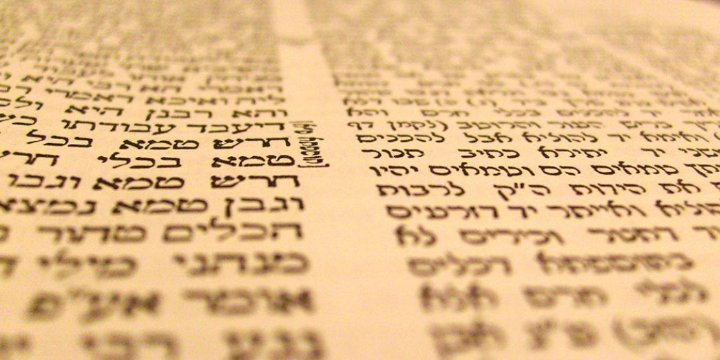 The Talmud on a Desert Island
The Talmud on a Desert Island
Jeremy Rosen
 A page of Talmud. Photo: Chajm Guski/Wikimedia
A page of Talmud. Photo: Chajm Guski/Wikimedia
One of the longest-running radio program series on the BBC is “Desert Island Discs.” It began in the year of my birth, 1942, and is still running. On the show, a very wide range of people are asked to imagine that they are shipwrecked on a desert island, and have to choose and talk about their favorite pieces of music and a favorite book to take with them. It is usually both entertaining and instructive, and I often thought about what my choices would be. But I found the process very frustrating. At least in music, there are so many different genres. And literature? Only one book?
My world was and is a multi-track world. Both in literature and music (let alone philosophy) I have very different interests and experiences. This wasn’t a challenge for me alone. Many people have been brought up in dual cultures, and are much richer for it. But I developed a profound dislike for the whole issue of having to choose favorites — politicians, leaders, rabbis, colors, sounds, books, etc
Who was the greatest anything? The greatest Jew? The greatest American? The greatest Briton? The greatest tap dancer, fisherman, clown, or crook? Take music. If classical, would one want to pick just one of the great classical composers? Or at the other end of the spectrum, jazz or pop music? Even when it comes to colors, there are several I like.
But to play the BBC’s game, I would choose the Talmud. And that might be a brilliant choice for a desert island because it is so vast. There is no other book I know of that contains so much.
The Talmud is an amazing encyclopedia of Jewish law, lore, theology, mysticism, history, magic, superstition, intellectual gymnastics, casuistic argument, fantasy, and spirituality. For a thousand years, when Jews were excluded from Christian academia, the whole of Jewish intellectual endeavor focused on studying, memorizing, explaining, resolving, and living within the intellectual chambers of the Talmud. It stretches one’s imagination and challenges one’s intellect far more than any academic text I have encountered at the very best of universities.
As a teenager, my father introduced me to one of the greatest Jewish books of the last century, Ephraim E. Urbach’s “The Sages: Their Concepts and Beliefs.” It was written in Hebrew and then translated into English. It describes the personalities and the ideas of the sages who contributed to the Talmud.
As a lecturer, I am often asked what the best way to enter the world of Talmud is. The ideal is to find a teacher who can guide you gently into its mysteries and challenges. But failing that, or going to a yeshivah, I recently came across another translation from Hebrew into English, also called “ The Sages” by Benny Lau, published in five volumes by Maggid Books. I wouldn’t necessarily recommend buying all of the five volumes, but you can buy just the first one, and then if you enjoy it, go on to the rest. It is less academic than Urbach, more popular, and an easier read. It takes you through the development of the Talmud and is a great place to start.
There is a message in all of this. Currently both in the Diaspora and Israel, there is a flow of negative articles attacking the Haredi world’s preoccupation with full-time Talmud study and the absence of secular studies in many yeshivas. When you realize the breadth of the subject matter covered when one studies Talmud you realize how intellectually challenging the subjects are, what a range of mental disciplines they require, and how intensive the concentration and mental acuity required are to make sense of, let alone master, the subject matter.
I have come across highly successful non-Jewish people in commerce, finance, and the professions who have told me how many brilliant minds they have encountered thanks to the Talmudic training that enabled them to excel. Even if they came to their profession or areas of expertise with a Talmudic rather than a secular foundation, they were still able to succeed because of the intensiveness of yeshiva methodology.
But there is another aspect to the issue where I side with the critics. One has to differentiate between those who have good abstract brains that are sharpened by Talmudic debate, and maybe the majority who sadly lack either intellectual capacity, motivation, or simply interest in the casuistic aspect of Talmudic studies.
I understand the mentality that believes that the only response to the decimation of Haredi life in the Holocaust requires the rebuilding and restocking of Torah scholarship. But the crisis is now over. The Haredi world is strong, confident, and dynamic, even triumphalist. It is time to add different curricula to suit different minds. And at last, one sees a few hopeful signs that they are beginning to address this problem.
There are current campaigns in the US and Israel to demean Haredi education and impose unwanted changes. Successful Talmudic education, far from being in any way inferior to the secular world, is as demanding and requires discipline and effort as much as most secular education models. Anyone who wants to understand Judaism seriously, not just superficially or in a simplistic or deracinated form, has to come to terms in one way or another with the Talmud. And this is a good place to start.
The author is a writer and rabbi, currently based in New York.
Zawartość publikowanych artykułów i materiałów nie reprezentuje poglądów ani opinii Reunion’68,
ani też webmastera Blogu Reunion’68, chyba ze jest to wyraźnie zaznaczone.
Twoje uwagi, linki, własne artykuły lub wiadomości prześlij na adres:
webmaster@reunion68.com
